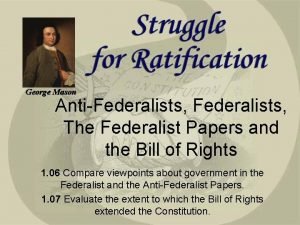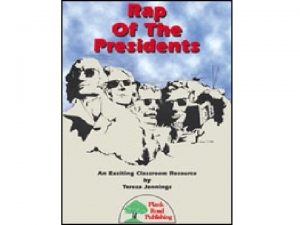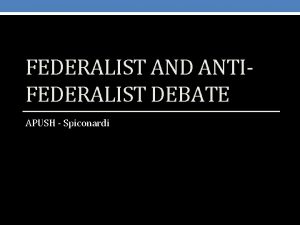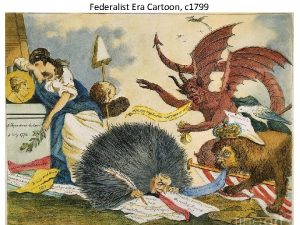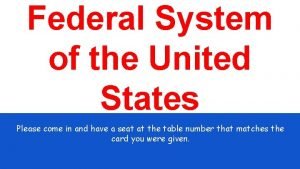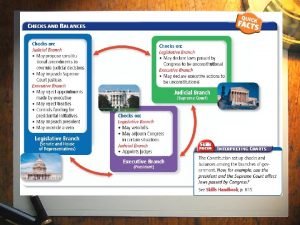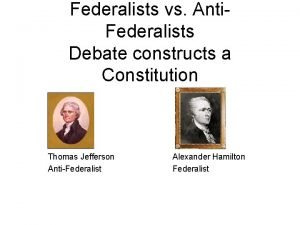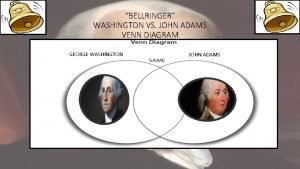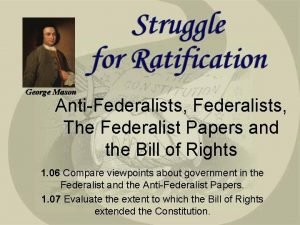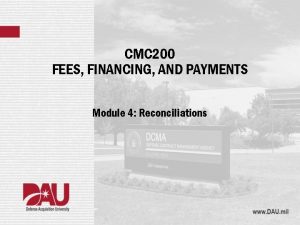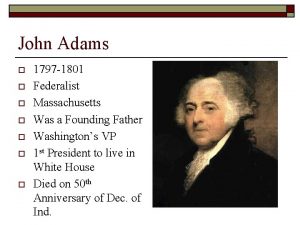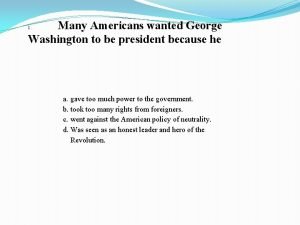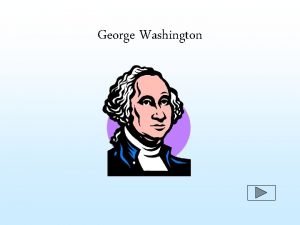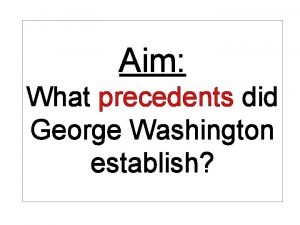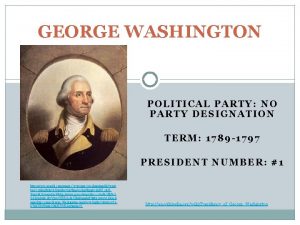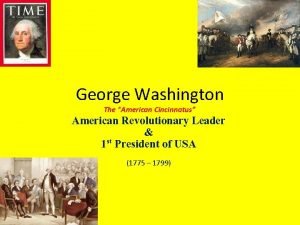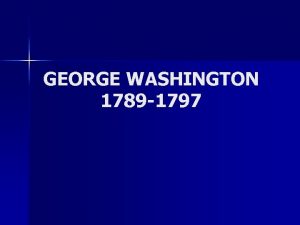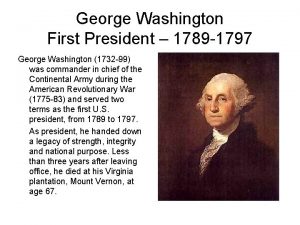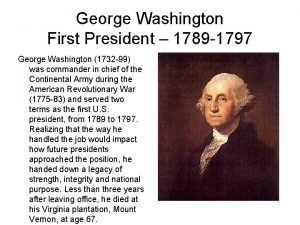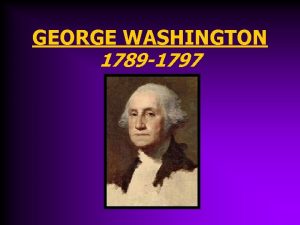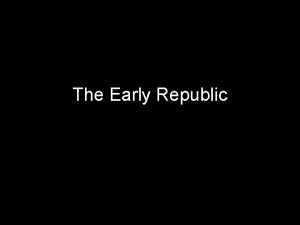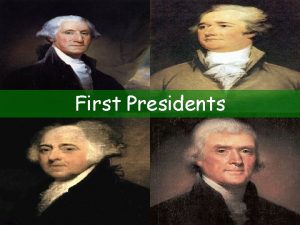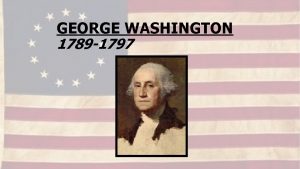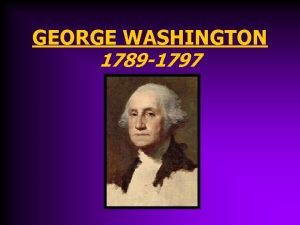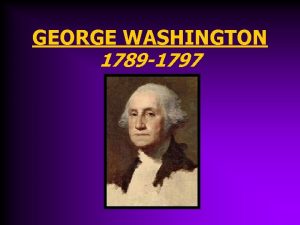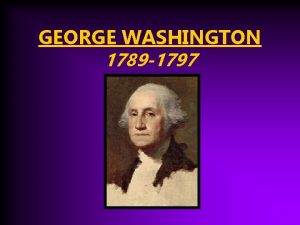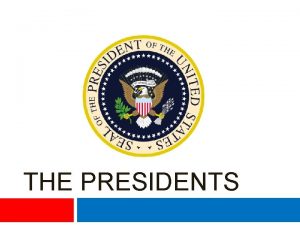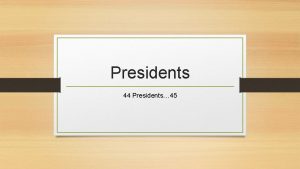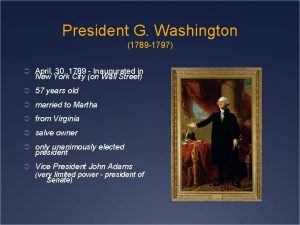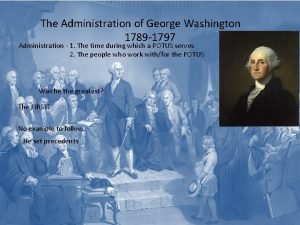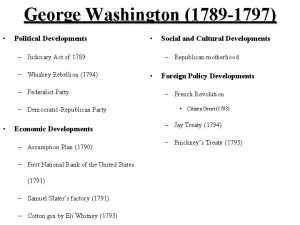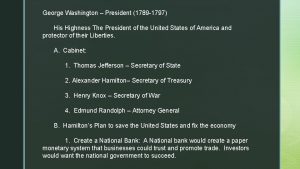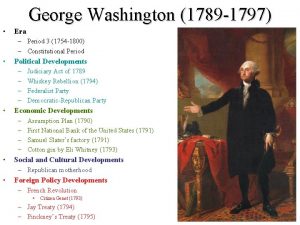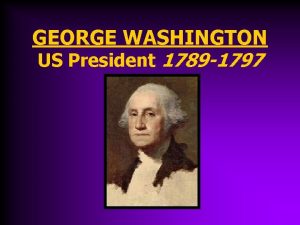The Presidents 1 George Washington Federalist 1789 1797



























- Slides: 27

The Presidents

1 - George Washington, Federalist, 1789 - 1797 (4, 28) • Set “precedents”: 1 st Cabinet – advisors, heads of departments • Supports Alexander Hamilton’s financial plan • Farewell Address/ Proclamation of Neutralityestablishes policy of neutrality

2 - John Adams, Federalist, 1797 - 1801 15 • Struggled with England/ French Wars • Alien and Sedition Act- violated freedom of speech and press

3 - Thomas Jefferson, Democrat. Republican 1801 - 1809 5 • “Revolution of 1800”- Democratic Republicans win election; peacefully take power • Limited government (strict construction of Constitution) • Louisiana Purchase- goes against strict construction

4 - James Madison, Democrat. Republican (1809 - 1817) 14 • “Father of the Constitution” • War of 1812

5 - James Monroe, Democrat. Republican (1817 - 1825) 13 • Monroe Doctrine (1823) – western hemisphere- Europe stay out!! – Retains neutrality/ isolationism in European affairs

7 - Andrew Jackson, Democrat (18291837) 6 29 • “Jacksonian Democracy”– suffrage given to all white men during this time – “spoils system”- supporters get government jobs • Supported Native American Removal Policy– goes against Worchester v. Georgia decision • Vetoes the Second Bank of US • opposes Calhoun’s nullification of the Tariff of 1828

11 - James K Polk, Democrat, 18451849 • Ran on fulfilling Manifest Destiny – Supports annexation of Texas (1845) – “ 54 40 or fight!” – Purchases Oregon (1846) – Led nation during Mexican War (1846 -48) – Treaty of Guadalupe Hidalgo- Mexican Session • Great topic for lots of THEMATICS!!

16 - Abraham Lincoln, Republican, 1861 -65 24 27 • Lincoln Douglas Debates in 1858 make him famous – Argues against EXPANSION of slavery • First Republican president – Party formed in 1854 after Kansas Nebraska Act opened more territory to slavery • Used war powers during Civil War to preserve the Union – Suspended habeas corpus for Confederate supporters – Emancipation Proclamation- turns Civil War into a war to END slavery in 1863; uses power as Commander in Chief

16 - Abraham Lincoln, cont’d • Gettysburg Address– gives meaning to the Civil War- nation will have a “new birth of freedom” • Very lenient Reconstruction Plans for South • Assassinated before end of Civil War

17 - Andrew Johnson 3 • Impeached by House after bitter arguments with RADICAL REPUBLICANS over Reconstruction

24 - William Mc. Kinley, Republican, 1897 -1901 16 • Spanish American War • Open Door Policy issued by Sec. of State John Hay • Annexed Hawaii • Assassinated 1901

25 - Teddy Roosevelt, Republican, 1901 -1909 21 26 35 • “Square Deal”- PROGRESSIVE domestic program – – Trustbuster conservationist Mediates coal miner strike The Jungle- Meat Inspection Act • Imperialist in foreign policy – Roosevelt Corollary- • Adds to Monroe Doctrine • POLICE POWER IN Latin America – “Big Stick Diplomacy” • Increases navy • Panama Canal

26 - William Taft, Republican, 19091913 • “Dollar Diplomacy”- supported US business interests with diplomacy and military support in Latin America

27 - Woodrow Wilson, Democrat, 1913 - 1921 8 • New Freedom- Progressive president • Reforms: – Clayton Antitrust Act – Creates the Federal Reserve System (controls currency) – Federal Trade Commission (investigates trusts) • WWI president • 14 points- his idea for peace • Senate refuses to ratify the Treaty of Versailles and join the League of Nations (isolationism)

30 - Herbert Hoover, Republican, 19291933 7 • Laissez faire, pro business • Stock Market Crash • Opposes direct relief (would ruin “rugged individualism”) • Uses troops vs. “Bonus Army”

31 - Franklin Delano Roosevelt, Democrat, 1933 -1945 23 25 • New Deal/ World War 2 president – POWER OF FED GOV’T increases • • Wagner Act- Supports Unions Long term reform: Social Security; SEC Executive Order 9066 - Internment of Japanese Elected 4 times- 22 nd Amendment

32 - Harry S Truman 1945 -1953 2 30 • • • Atomic bomb Truman Doctrine- policy of containment Marshall Plan Korean War GI Bill Desegregates military

33 - Dwight Eisenhower 1953 - 1961 20 32 • • • Supreme Commander of Allies in World War 2 Eisenhower Doctrine (Cold War in Middle East) Federal Highway Act Little Rock 9 Dulles- “Brinksmanship”- Arms Race

34 - John F Kennedy 1961 - 1963 11 • New Frontier – Moon! – Peace Corps – Pushes for Civil Rights Act • Cuban Missile Crisis • Assassinated

35 - Lyndon Baines Johnson (19631969) 17 31 • Vietnam- Gulf of Tonkin Resolution – escalation – Doesn’t seek re-election in 1968 • Great Society- War on Poverty – Medicare – Civil Rights Act of 1964

36 - Richard Nixon Rep (1969 - 74) 1 33 • Vietnamization • Détente with USSR and China • Watergate- resigns • 37 - Gerald Ford – Pardons Nixon

38 - Jimmy Carter, Democrat 9 • Economic problems: inflation & oil shortages – OPEC embargo on oil • Camp David Accords: peace between Israel and Egypt

39 - Ronald Reagan 1981 -89 18 • Conservative revolution – Social issues: abortion, school prayer • Supply side economics (“Reaganomics”) – Lower taxes, less regulation, pro big business – Reaction against Great Society • Trade and budget deficits • “Star Wars” • “Tear down this wall” speech

41 George H Bush (1989 - 92) 12 • “no new taxes” whoops! • Persian Gulf war – Iraq invades Kuwait, 1991 – Builds UN coalition; very successful

42 - William Jefferson Clinton 19 • • NAFTA- free trade in North America Backs NATO forces in Serbia (ethnic cleansing) Balances budget Impeached by House for perjury; acquitted by Senate

GW Bush 32 • Controversial 2000 election vs. Gore • 9/11 responses: – Homeland Security/ Patriotic Act – Afghanistan/ Iraq
 1797 - 1789
1797 - 1789 Was george mason a federalist
Was george mason a federalist These are the presidents mighty mighty presidents
These are the presidents mighty mighty presidents Ratification debate apush
Ratification debate apush Federalist vs anti federalist cartoon
Federalist vs anti federalist cartoon Federalist vs anti federalist political cartoon
Federalist vs anti federalist political cartoon Are you a federalist or anti federalist quiz
Are you a federalist or anti federalist quiz Anti federalists vs federalists
Anti federalists vs federalists George washington vs king george iii
George washington vs king george iii George washington vs king george iii venn diagram
George washington vs king george iii venn diagram George mason anti federalist
George mason anti federalist Sturm und drang geschichtlicher hintergrund
Sturm und drang geschichtlicher hintergrund What is the melody of gretchen am spinnrade
What is the melody of gretchen am spinnrade Dcma etools
Dcma etools John adams 1797-1801
John adams 1797-1801 Pop bottle person
Pop bottle person Which statement best characterizes american farmers in 1790
Which statement best characterizes american farmers in 1790 George washington university student accounts
George washington university student accounts George washington socks chapter 15
George washington socks chapter 15 Indianstammar
Indianstammar George washington was born in february
George washington was born in february What precedents did george washington set
What precedents did george washington set George washington dixon
George washington dixon George washington political party
George washington political party Gwu electrical engineering
Gwu electrical engineering Carver high school uniform
Carver high school uniform George washington nose
George washington nose George washington and cincinnatus
George washington and cincinnatus

